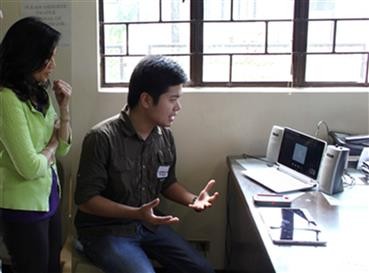
To support the Government of the Philippines’ (GPH) goal of achieving sustained and inclusive growth, the United States Agency for International Development (USAID) is focusing its work on the bilateral Partnership for Growth, efforts to foster peace and stability in conflict areas in Mindanao, and measures to build environmental resilience. To help the country leapfrog its constraints to growth, USAID has strategically included science, technology and innovation (STI) in its programming.
The US Government contributes to the priorities of the U.S.-Philippines Science and Technology Agreement signed by former U.S. Secretary of State Hillary Clinton and Philippine Secretary of Foreign Affairs Albert Del Rosario on June 2012. The US Embassy’s joint Agreement with the GPH focuses on strengthening scientific, technological and institutional capabilities and promoting scientific and technological cooperation.
OUR WORK
Climate and Disaster Resilience and Natural Resource Management
- USAID and the U.S. National Oceanic and Atmospheric Administration (NOAA) is assisting the Philippines Department of Science & Technology with storm surge modelling, training, and study visits to NOAA scientific centers.
- USAID’s partnership with Department of Science and Technology, Microsoft, and local governments is using TV White Space technology to register 1.3 million fisherfolk to give them access to GPH basic services and help in fisheries conservation.
- USAID supports the GPH’s Energy Reform Agenda and the use of renewable energy and environment-friendly alternative energy to assist in realizing its guiding vision of “Energy Access for more.” In Boracay, a major tourist destination, USAID has partnered with a transport cooperative to install a solar charging station for electric tricycles. USAID also installed a 25.5kW Hybrid Renewable Energy Power System on Sitio Green Island in Roxas, Palawan. The system, composed of a biomass gasifier which uses plant-derived energy, along with solar panels and wind turbines, aims to provide reliable and sustainable electricity to “missionary areas,” or areas that are not connected to the main electricity grid.
- USAID piloted the Rapid Assessment of City Emissions Tool in Batangas City to address increasing levels of emissions due to rapid urbanization. The tool, which uses maps and geographic systems, will provide information on estimate energy use, building needs, transportation, and flood hazard scenarios to assist Batangas City in more effective and sustainable local planning.
- Through the Office of Foreign Disaster Assistance, USAID is helping the Philippines improve its ability to respond to natural disasters and adapt to the negative impacts of climate change by setting up Early Warning Systems in flood and landslide-prone communities; introducing mobile and web-based applications technology; and promoting digital literacy.
Economic Development and Governance
- USAID is helping to develop local governments’ and businesses’ abilities to offer mobile money as a payment option for their services. USAID is working with microfinance institutions to use mobile money to facilitate deposits, collect loan payments, and service payroll and loan payouts.
- With USAID support, the Court of Appeals, which handles 90 percent of appealed cases, implemented an automated case management information system (E-court) that reduced its backlog by more than 200,000 cases. Building on this success, USAID completed the pilot installation of E-court in Quezon City, the largest court station in the Philippines with 54 trial courts and an estimated 10 percent of the total caseload of the judiciary.
Education
- In support of GPH efforts to improve STI, USAID provides grants to generate collaborative research between Philippine universities and industries. USAID will also set up a post-doctoral center to service higher education centers and develop Professional Science Master’s degrees for Philippine universities.
- USAID is partnering with Philippine Development Foundation (PhilDev) to inject entrepreneurship culture into the engineering and science programs of Philippine higher education. USAID will tap successful Filipino diaspora talent from Silicon Valley to strengthen the innovation ecosystem and boost ‘technopreneurship’ in the country.
Health
- USAID helped create an electronic medical record system, which facilitated access to 300,000 patients and generated 700,000 patient consultations, significantly improving delivery of health services and advice.
- USAID initiated support for researching the utilization of Oxytocin in Uniject, a pre-filled, exact dose of oxytocin that provides an efficient alternative to preventing post-partum hemorrhage. This proven, innovative technology aims to reduce the number of maternal deaths in the Philippines.
- USAID supports research on tuberculosis (TB) in children and the relationship of tobacco and TB in children.








Comment
Make a general inquiry or suggest an improvement.